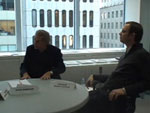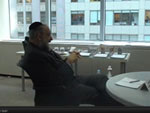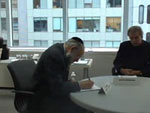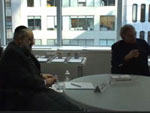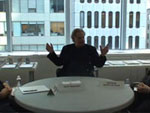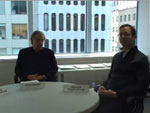David Birnbaum: That’s the metaphysics architecture—
Male 1: That assumes that there is a fundamental limitation of the divine which is limitation of the divine which is determined by observing our universe. We just assume that we are the only universe that in fact exist and there [cross talk].
David Birnbaum: Now I don’t know if there is another universe or not. I have hard enough time dealing with this cosmos. I am dealing with one cosmos at a time. In this cosmos, which I can to some extent observe these appear to be the ground rules. Are there other universes? It’s possible. I don’t deal with them. I leave that to the next guy.
[Cross Talk]
Male 1: The other universe.
David Birnbaum: I say lot of cosmologists that deal with the origin of cosmos, well the answer is [inaudible 00:47] there were actually many universes, multi-universe. It doesn’t help you at all. So where did those come from? So I deal with this cosmos with limited human kinds of observations. This particular framework skeleton of theories, of this unified theory would seem to work, would seem to work. Yes. You have to finesse the origins of Quest for Potential. Yes, that’s the whole Torah as I said, but again, it seems to me it’s an easier proposition to make that this infinite potential as an eternal origin is an easier proposition to make than the God of Israel per se with [inaudible 01:35] potential as core as eternal proposition. So it’s subjective and—
Male 1: One other question, if I understand it correctly from listening now, when you say that this potential thing becomes the God of Israel, do you mean that as this potential thing does certain things, by doing those things it becomes the sum of its own experiences. So for example, if I would go to medical school I would become a doctor, right, because I would learn all those things and they would affect me, and now because I studied those things I am a doctor. So I start to have kind of undefined divine force but I make decisions, if I make decisions to actualize myself by taking these guys from here and take them out of that country and to do this miracle but unfortunately to [inaudible 02:27] persecuted in the Middle Ages and all of that, I become the God of Israel because I have chosen to do certain things which we call the things that the God of Israel did. So what really in the debate of attributes is of essence I think–
David Birnbaum: But you like to go into that zone. You like to go into the zone of attributes and essence of divine and a lot of rabbinics and scholars like to go into that zone. I don’t like to go in that zone. To me it’s like trying to define love. Some things you don’t try to define because you can’t define them. So I sort of take it as far as I can meaning that Quest for Potential is eternal, Quest for Potential is at the core of the divine. I do not have the intellectual firepower to take it much further than that and I leave it, if I am so lucky, to different extrapolators of my proposition. Down the road he says this, he says that. I don’t have the intellectual firepower nor do I have the servitude to take it much further. To me, it’s like defining love. I can’t define love. I can’t take it much further than that. To me, it’s somewhat subjective. You can have it your way and he can have it in this way. It seems to me these are the basic parameters. Somehow somewhere Quest of Potential is at the core of divine and the two are seamless.
Male 1: The argument of metaphysics is really true as is lot of existentialism is that the argument of metaphysics in general, metaphysics [inaudible 03:51] what if it’s really true, not what I perceive is really true.
David Birnbaum: Oh it is true [cross talk].
Male 2: I mean even going back to — you know if you go back to [inaudible 04:02] that you go back to the classical philosophers, they all realize that there is a kind of limit to your [cross talk]
[Cross Talk]
Male: We assume that what they are saying as metaphysics but [cross talk]
Male 2: –acts at some level but if you talk about a negative theology or the [inaudible 04:18] form of the good, they say well it’s true but within our particular language and ultimately we can [cross talk].
David Birnbaum: Okay. So I suggest at this point, and it’s very vibrant, that we sort of do parting shots, like parting shot 1 and then if you want to go one more round so we put parting shots to the discussion. How is that?
Male 1: Okay. Parting shot would be that I think that if someone were to want to analyze these posts from scratch, say what motivates David Birnbaum, it’s the holocaust.
David Birnbaum: I say from get-go.
Male 1: Yes. Now so therefore one of the questions that we will have to ask over time is whether or not a metaphysical theory which starts from something, so historical evaluation, forget about philosophical, historical evaluation, whether or not the cart is driving the horse or the horse is driving the cart, now I would suggest that when people examine this now who are capable of that kind of analysis, I think it’s one of the big questions that as you said something very interesting here and it’s in one of the books which is that the Quest for Potential in a certain sense is a theory which sort of once the holocaust occurs it now becomes clear why it worked that way for creation. So it means to say that people will have to judge the extent to which if that’s driving force that there had there been no holocaust you would have gone on same theory.
David Birnbaum: I think book one certainly is captive to that dynamic. I think book two is liberated from that dynamic and the two books work together, but you have a good point. It’s a fair point. That’s an interesting point for me to think about.
Male 2: There is a couple of things that I would be interested in. One is [inaudible 06:23] further is the degree to which this is a work of the Diaspora, where does the State of Israel come in? Where is Zionism? What is the place of
that and how does that impact? Would this work be different work if you were writing it in Israel? And kind of connected with that, I think that there are some figures that do have bearing on your work that I think for future study it would be very interesting to compare to, and for instance Rabbi Kook.
David Birnbaum: We love Rabbi Kook heavily. I love [cross talk]. He’s beyond — he is a towering figure in my mind.
Male 1: Well Danny [inaudible 07:06] obviously loves to write a book.
David Birnbaum: We don’t love Rabbik Kook.
Male 2: Right. So I think there are certain kinds of things in 20th Century that I think that this dialog can be expand even further and it would be interesting to see.
Male 1: There is a lot in common with Rabbi Kook.
David Birnbaum: Right, a lot, right. He would be sort of the Rabbinic spiritual godfather almost of Summa on some level. Do you have a finale parting prize?
Male 1: Well, a parting comment would be that people would be talking about these things forever and we will all be talking about it forever and we always say to people we have personal problems with all these issues. You know they say if you keep talking about it, in some way it sorts of alleviates the problem and I think that on some level we attempt to contribute an answer to these set of questions is a very important contribution. Whenever we will debate the answer but the thing doing it, worrying about these kinds of issues is a very important thing to do.
David Birnbaum: Right. Well, so we all know that but we would hope to believe that we have it pretty much right. I gave a parting shot. Do you have a parting shot?
Male 2: I don’t think–
David Birnbaum: You rest your case?
Male 2: I rest my case.
David Birnbaum: Okay. That will wrap it up and thank you very much.
Male 1: Thank you.
David Birnbaum: Okay. It was good.
For David Birnbaum philosophy, metaphysics, see also Dice1000
